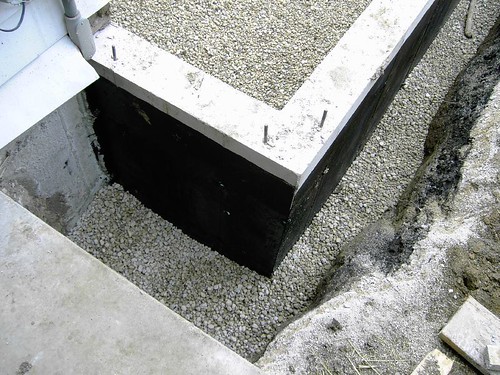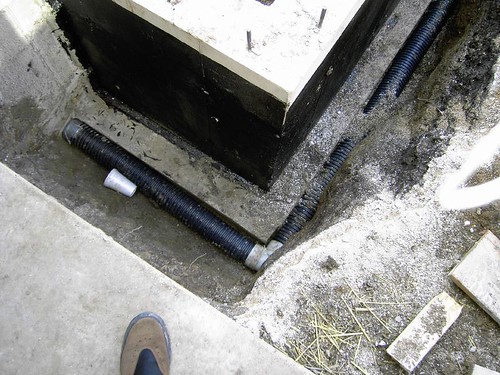Drain Tile Installation Servicesin Clinton Township MI
Drain Tile Installation for Optimal Water Management
We Are Locally Owned & Operated For Over 37 Years
Contact Us Today!
We Serve Businesses In And Around The Following Cities:
About Drain Tile Installation Services
Introduction: Unearth the Significance of Drain Tile Installation
When considering commercial property investments in Clinton Township, one key provision often gets overlooked — Drain Tile Installation. Being at the forefront of green infrastructure and sustainable landscapes, drain tile systems are revolutionizing the way we manage stormwater. Helping to prevent costly water damage, drain tile installation serves a crucial role in sustaining the structure and value of your property, while also supporting effective water management. More than just mere conduits for water movement, these intricate systems enhance the foundation’s integrity, preserving the property’s appeal and functionality for years to come.
The Intricacies of Drain Tile Installation Process
Understanding the process of installing a drain tile system gives you a peek into the sophistication and precision necessary for this task. The process commences with excavating the area around the foundation, ensuring it’s slope directs water away from the building. It’s here drain tile for yard plays its part. Subsequently, a waterproof barrier is applied to the exterior wall to prevent water infiltration.
Next in line is the installation of the drain tile system around the foundation, critical for guiding water away from the structure. This drain tile often manifests in the form of french drain tile or basement drain tile system, depending on the building’s unique requirements. The drain tile around the basement safeguards the integrity of the structure, preventing water seepage and associated damage.
Once the drain tile is securely in place, backfilling commences with gravel to encourage seamless water flow. The rare combination of skill and dexterity offered by seasoned drain tile contractors make D&J Contracting an excellent choice for executing these intricate tasks proficiently.
Real World Applications: Making the Most Out of Drain Tiles
Drain tile systems can be spotted in a wide array of commercial applications. From managing runoff water in large parking lots to reducing yard flooding in commercial green spaces, drain tiles are the hidden guardians of our commercial structures. For instance, laying drain tile in the yard creates micro-tunnels that quickly channel stormwater away, mitigating soggy lawns and water pooling.
Installing drain tile around existing houses and extending it from gutters can protect the foundation and basement from water damage. These drain tile systems can also be used to direct rainwater to a rain barrel or garden, linking sustainable stormwater management with aesthetic improvements to the property. This is where drain tile backyard installations come into play.
No doubt, a well-executed drain tile system can save businesses from incurring substantial repair costs and reputation damage, crucial elements that service providers such as D&J Contracting take into account during the installation process.
Deciphering the Advantages of Installing Drain Tile
The advantages of installing a drain tile system are manifold. It helps maintain the structural integrity of your commercial building, rule out flooding, minimize dampness, mold, and mildew in basements. Moreover, it ensures the longevity of landscaping and gardens and prevents soil erosion. Furthermore, safeguarding basements from dampness enhances the usable space, enhancing the potential return on the property investment.
A basement drain tile installation prevents hydrostatic pressure build-up that can cause severe damage to your building’s foundation over time. A competent basement drain tile contractor, such as D&J Contracting, can ensure successful installation, warding off potential issues.
Additionally, French drain tile systems offer significant utility by channeling excess water away from your property, preventing pooling and water damage. Upgrades to the French drain tile system can even redirect this water for garden irrigation, marrying practicality with sustainability.
Drain Tile Installation in Clinton Township: A Necessity for Commercial Investments
In the bustling business environment of Clinton Township, commercial builders and businesses know that drain tile installations are not just essential; they are vital. With businesses now and then popping up, the overall value of a commercial property substantially depends on how well-prepared it is for an unexpected weather event. A proactive approach to drain tile installation can keep a commercial property afloat when the floodgates of Michigan’s weather unpredictability bursts open.
Protecting your commercial property in Clinton Township should be as simple as investing in the reliable, expert services of a drain tile contractor. D&J Contracting, with a solid reputation and extensive experiences in the commercial landscape, can provide the proficiency, knowledge, and skills needed to protect and enhance your property’s value and integrity.
Embrace the United Front: Drain Tile Installation for Commercial Properties
Simply put, the importance of implementing a robust drain tile system cannot be overstated. Businesses are not merely purchasing a preventative measure for infrastructure integrity. They are investing in a healthier, more sustainable future. Choosing to accompany this venture with skillful service providers like D&J Contracting, famous for assuring quality and extending top-notch service, can assure the property remains unfazed by the city’s stormwater challenges. Moreover, as an experienced contractor operating in Clinton Township, they bring an understanding of the local environment, contributing to efficiency and optimized results.
So, for businesses eyeing long-term investment protection in Clinton Township, acknowledging the benefits of a proficiently executed drain tile installation is the key takeaway. Together, let’s make the robust foundations of our commercial buildings last. Let’s make them stand tall and proud, irrespective of the weather turmoil the seasons may bring.
Drain Tile Installation Services Gallery


Call Us Today to receive your Free Quote for
Drain Tile Installation in Clinton Township
Serving: Clinton Township, Michigan

About Clinton Township, Michigan
The first settlement on the land that is now Clinton Township was called Gnadenhuetten and was established in 1782 by Rev. David Zeisberger, but closed in 1786. It was organized as “Huron Township” on August 12, 1818, named after what was then known as the Huron River. Because of confusion with another Huron River south of Detroit, on July 17, 1824, the Michigan Territorial Legislature renamed both the township and the river after DeWitt Clinton, the popular governor of New York from 1817 to 1823 who was largely responsible for building the Erie Canal which enabled many settlers to come to Michigan.
Moravian Drive is the township’s oldest road, dating back to the days when Moravian missionaries settled to attempt to convert the local Native Americans.
Clinton Township is in south-central Macomb County. The city of Mount Clemens, the Macomb county seat, is bordered on three sides by the northeast part of the township.
According to the United States Census Bureau, Clinton Township has a total area of 28.37 square miles (73.5 km), of which 28.03 square miles (72.6 km) are land and 0.35 square miles (0.91 km), or 1.22%, are water. The Clinton River, for which the community is named, is formed from three branches within the township. It runs east into Harrison Township, where it flows into Lake St. Clair. The township is home to many parks, notably George George Memorial Park.
There are two unincorporated communities in the township:
- Broad Acres is located in the southeastern portion on M-3/Gratiot Avenue between 15 Mile and Quinn Roads (42°32′57″N 82°54′08″W / 42.54917°N 82.90222°W; Elevation: 610 ft./186 m.).
- Cady is located in the southwestern portion at Utica and Moravian Roads (42°33′37″N 82°57′52″W / 42.56028°N 82.96444°W; Elevation: 614 ft./187 m.). It was founded in 1833 by Chauncey G. Cady. Cady served for a time as township supervisor and was also a member of the state legislature. It had a post office from 1864 until 1906.
| Census | Pop. | Note | %± |
|---|---|---|---|
| 2000 | 95,648 | — | |
| 2010 | 96,796 | 1.2% | |
| 2020 | 100,513 | 3.8% | |
| 2023 (est.) | 99,377 | −1.1% | |
| U.S. Decennial Census | |||
| Race / Ethnicity (NH = Non-Hispanic) | Pop 2000 | Pop 2010 | Pop 2020 | % 2000 | % 2010 | % 2020 |
|---|---|---|---|---|---|---|
| White alone (NH) | 86,042 | 78,062 | 72,926 | 89.96% | 80.65% | 72.55% |
| Black or African American alone (NH) | 4,424 | 12,509 | 17,428 | 4.63% | 12.92% | 17.34% |
| Native American or Alaska Native alone (NH) | 223 | 230 | 192 | 0.23% | 0.24% | 0.19% |
| Asian alone (NH) | 1,597 | 1,723 | 2,170 | 1.67% | 1.78% | 2.16% |
| Pacific Islander alone (NH) | 11 | 29 | 19 | 0.01% | 0.03% | 0.02% |
| Other race alone (NH) | 82 | 82 | 335 | 0.09% | 0.08% | 0.33% |
| Mixed race or Multiracial (NH) | 1,605 | 1,871 | 4,449 | 1.68% | 1.93% | 4.43% |
| Hispanic or Latino (any race) | 1,664 | 2,290 | 2,994 | 1.74% | 2.37% | 2.98% |
| Total | 95,648 | 96,796 | 100,513 | 100.00% | 100.00% | 100.00% |
As of the census of 2010, there were 96,796 people, 42,036 households, and 25,678 families residing in the township. The racial makeup of the township was 82.08% White, 13.04% African American, 0.28% Native American, 1.79% Asian, 0.03% Pacific Islander, 0.61% from other races, and 2.17% from two or more races. Hispanic or Latino people of any race were 2.37% of the population. By 2016, the township’s population was estimated to have surpassed 100,000.
In 2000, there were 40,299 households, out of which 28.1% had children under the age of 18 living with them, 48.7% were married couples living together, 10.9% had a female householder with no husband present, and 36.6% were non-families. 30.8% of all households were made up of individuals, and 10.8% had someone living alone who was 65 years of age or older. The average household size was 2.35 and the average family size was 2.98.
In 2000, 22.4% of the population was under the age of 18, 9.1% from 18 to 24, 30.9% from 25 to 44, 23.4% from 45 to 64, and 14.3% who were 65 years of age or older. The median age was 37 years. For every 100 females, there were 92.4 males. For every 100 females age 18 and over, there were 88.5 males. The median income for a household in the township was $50,067, and the median income for a family was $61,497. Males had a median income of $48,818 versus $29,847 for females. The per capita income for the township was $25,758. About 4.2% of families and 5.8% of the population were below the poverty line, including 7.4% of those under age 18 and 6.8% of those age 65 or over.
Chippewa Valley Schools, with two high schools (Chippewa Valley and Dakota), and Clintondale Community Schools, with one high school (Clintondale High), are the primary school districts in the township. Other school districts that operate within Clinton Township are L’Anse Creuse, Fraser, and Mount Clemens.
Call Us Today to receive your Free Quote for
Drain Tile Installation in Clinton Township
Related Services in Clinton Township, Michigan
We Serve Businesses In The Following Zip Codes:
48007, 48015, 48021, 48026, 48035, 48036, 48038, 48042, 48043, 48044, 48045, 48046, 48047, 48048, 48050, 48051, 48066, 48071, 48080, 48081, 48082, 48083, 48084, 48085, 48088, 48089, 48090, 48091, 48092, 48093, 48098, 48099, 48225, 48230, 48236, 48310, 48311, 48312, 48313, 48314, 48315, 48316, 48317, 48318, 48397